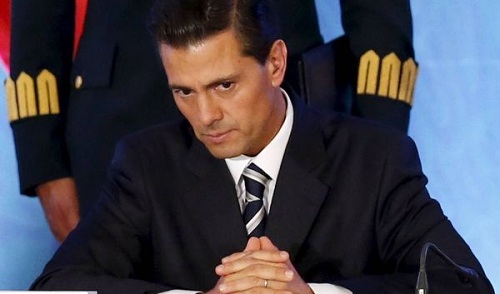According to Mark Browne author for CNSNews.com, a division of the Media Research Center, Mexico’s government faces the lowest level of public confidence seen in nearly a generation, with 61 percent of respondents in a recent poll by the Mitofsky organization saying the country is headed in the wrong direction.
Polling experts say the problem extends well beyond the presidency to the country’s governors, who “never land in prison” for corruption, according to a 2016 report on Mexico’s democracy by the Bertelsmann Foundation.
Public concern with corruption is the highest seen in 11 years, according to the Mexican polling firm, Consulta Mitofsky.
President Enrique Peña Nieto’s approval rating is at the lowest level of his presidency, which began at the end of 2012. Public disapproval of his performance, according to the firm’s latest polls for this year, stands at 61 percent.
Most surprising is a recent spike in the public’s disapproval of the nation’s governors, according to Francisco Abundis of the polling firm Parametria.
The governors’ disapproval rating is at 50 percent, the highest level seen in 14 years, according to Parametria’s latest survey of 1,000 respondents released in April, he said.
“For the first time in Mexico, we can speak of generalized discontent with the governing class not seen for 20 years,” Abundis said. “This is what surprises us. It’s not just the president that has a low approval rating.”
Mexico’s “biggest problems” are corruption and conflicts of interest, according to the report by the Bertelsmann Foundation, which monitors the health of open markets, democracy and the performance of public officials in 129 countries.
Its Mexico report, covering the period from February 2013 to January 2015, found that “corrupt governors and functionaries never land in prison and very few are forced to resign.”
“There are no independent institutions with the power to impeach or prosecute governors, the executive cabinet or the president himself,” the report said.
It cited “widespread corruption among judges,” allowing them to be manipulated by “criminal groups” and “economic interests.”
Mexico’s national Congress failed during its current session to act on anti-corruption legislation proposed by Peña Nieto, but members of the president’s party, the PRI, have promised to take up the measure during an extraordinary session this summer.
The reform calls for the creation of a federal prosecutor focused exclusively on corruption, a special anticorruption court and tighter auditing of public expenditures.
Meanwhile, the public’s growing disenchantment with Mexico’s democracy may be creating an opening for a populist candidate on the left to succeed Peña Nieto and win the presidency in 2018, according to a study by Medley Global Advisors as reported this week in The Financial Times.
Headlined “Mexico political risk on the rise,” the FT article specifically called out Andrés Manuel López Obrador, the former Mexico City mayor from the left who twice ran unsuccessfully for the presidency. He is back in the running again.
Obrador’s popularity was compared with Donald Trump’s success at capitalizing on GOP voters’ disenchantment with establishment politicians.
Responding to the report, Obrador in a press release chided the newspaper for its support of structural reforms to Mexico’s economy enacted by the Congress and the president, calling them a “failure.”
Opponents of Obrador’s populist policies have called him “a danger to Mexico.” He said this week that the real danger comes from those who have “dedicated themselves to robbing the public.”
Source: http://cnsnews.com/


